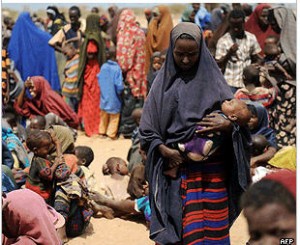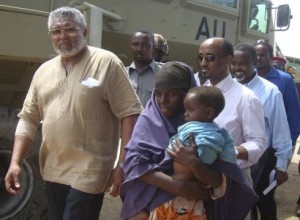Now that the herd-like American media have finished covering the debt-ceiling food fight between Republicans and Democrats, some news organizations are finally beginning to cover the drought and famine plaguing the Horn of Africa. I note especially the series of reports that NBC Nightly News has been airing this week.
To welcome their belated attention, I have decided to reprise my commentary on this unfolding humanitarian catastrophe, entitled Somalia: another drought and famine crisis in Africa, which was published almost two weeks ago (on July 22).
____________________
I know, I know: reading about the scourge of drought and famine in Africa is like reading about the menace of guns and drugs in America. And, truth be told, I harbor no illusions that anything I write will have any bearing on the looming fate of millions who are now competing with wild animals for food and water.
(Kenya facing drought and famine of biblical proportions, The iPINIONS Journal, September 21, 2009)
 This is how I began my appeal for donations to aid international efforts to combat drought and famine in Kenya two years ago. Clearly, even back then, my frustration with, if not cynicism about, this recurring theme in Africa was unbridled.
This is how I began my appeal for donations to aid international efforts to combat drought and famine in Kenya two years ago. Clearly, even back then, my frustration with, if not cynicism about, this recurring theme in Africa was unbridled.
This paled in comparison, however, to my abiding humanitarian concern for the innocent victims of this and the other myriad plagues – far too many of them anthropomorphic (i.e., caused by wars) – that have beset this Dark Continent from time immemorial.
So here I am, once again, begging for donations for yet another African country facing a humanitarian catastrophe. It’s bad enough that Somalia is a failed state at war with itself. But I’m also acutely mindful that it hardly evokes much sympathy given everything from the legacy of “Black Hawk Down” to the menace Somali pirates now pose on the High Seas.
Yet if the U.S. and other nations can launch a war (purportedly) to save thousands of innocent lives in Libya, surely they can donate funds to save millions of innocent lives in Somalia. (In fact, drought and famine are ravaging much of the Horn of Africa, which also includes Ethiopia, Eritrea, Djibouti, and Sudan.)
An estimated 10 million people have been affected in East Africa by the worst drought in more than half a century. More than 166,000 desperate Somalis are estimated to have fled their country to neighbouring Kenya or Ethiopia. The UN humanitarian co-ordinator for Somalia, Mark Bowden, said $300m (£186m) was needed to address the famine in the next two months
(The BBC, July 20, 2011)
 Ghana’s former president Jerry Rawlings is arguably the most admired and respected leader in Africa today – except of course for a now very frail Nelson Mandela. He now serves as the African Union’s High Representative for Somalia. Here is how he reconciled my cynicism and concern, which I suspect most of you share, in his appeal for aid:
Ghana’s former president Jerry Rawlings is arguably the most admired and respected leader in Africa today – except of course for a now very frail Nelson Mandela. He now serves as the African Union’s High Representative for Somalia. Here is how he reconciled my cynicism and concern, which I suspect most of you share, in his appeal for aid:
A potential disaster is staring us in the face. The world must now focus on tackling this unfolding catastrophe if we are to prevent further needless loss of life. [I call on the international community to] demonstrate compassion for Somalia. Its people should not be viewed through the prism of the country’s long conflict.
Prejudice or fatigue on account of the last twenty years would only serve as deterrents or impediment to the delivery of help. We must instead see the millions of men, women and children who are the innocent victims of this situation.
(Ghana News Agency, 20 July, 2011)
Instead of waiting for governments to act, however, there’s something you can do right now: Experts from the United Nations World Food Programme (WFP) are leading relief efforts. Please visit their website and make a donation to help them scale up their efforts: wfp.org
Related commentaries:
Kenya facing drought and famine…
Jerry Rawlings…